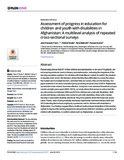| dc.contributor.author | Trani, Jean-François | |
| dc.contributor.author | Fowler, Patrick | |
| dc.contributor.author | Bakhshi, Parul | |
| dc.contributor.author | Kumar, Praveen | |
| dc.date.accessioned | 2021-02-24T11:51:08Z | |
| dc.date.available | 2021-02-24T11:51:08Z | |
| dc.date.issued | 2019 | |
| dc.identifier.citation | Trani J-F, Fowler P, Bakhshi P, Kumar P (2019) Assessment of progress in education for children and youth with disabilities in Afghanistan: A multilevel analysis of repeated cross-sectional surveys. PLoS ONE 14(6): e0217677. https://doi.org/10.1371/journal.pone.0217677 | |
| dc.identifier.uri | https://opendocs.ids.ac.uk/opendocs/handle/20.500.12413/16179 | |
| dc.description | RLOs | |
| dc.description.abstract | Recent study shows that 617 million children and adolescents–or six out of 10 globally- are not acquiring minimum levels in literacy and mathematics, indicating the magnitude of the learning acquisition problem. For children with disabilities in context of conflict, the situation is arguably even worse: the literature shows that they face difficulties to access the education system due to multiple barriers, and when they do access, they are not learning. Our paper examines if an active education policy promoting inclusion since 2005 in Afghanistan, a protracted crisis context, has been effective. Using two cross sectional household surveys carried out eight years apart (2005–2013), our study shows that access to school and literacy did not improve between 2005 and 2013 for children and youth with disabilities. Both access and literacy outcomes were worse for girls with disabilities, those with a mental, learning or associated disability and those living in household where the head was uneducated. Finally, odds of being mentally distressed significantly declined between 2005 and 2013 indicating that schools might play a protective role for children with disabilities in Afghanistan. Our findings suggest that a multilevel multi-pronged adaptation of the existing system to improve the learning experience and promote children’s resilience, particularly for children with disabilities, in conflict context such as Afghanistan, is required. | |
| dc.publisher | PLoSONE | |
| dc.rights.uri | http://creativecommons.org/licenses/by/4.0/ | |
| dc.title | Assessment of progress in education for children and youth with disabilities in Afghanistan: A multilevel analysis of repeated cross-sectional surveys | |
| dc.type | Article | |
| dc.rights.holder | Copyright: ©2019 Trani et al | |
| dc.identifier.externaluri | http://doi.org/10.1371/journal.pone.0217677 | |
| dc.identifier.ag | ES/M005011/1 | |
| dc.identifier.doi | 10.1371/journal.pone.0217677 | |


